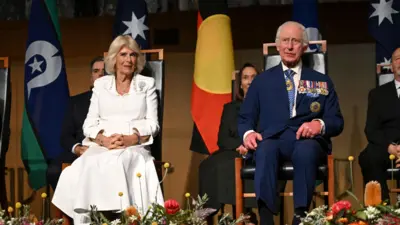We've updated our Privacy and Cookies Policy
We've made some important changes to our Privacy and Cookies Policy and we want you to know what this means for you and your data.
Oscars 2011: Film Council basks in King's Speech glory
- Author, Neil Smith
- Role, Entertainment reporter, ΒιΆΉΤΌΕΔ News
The success of The King's Speech will be a bitter-sweet triumph for the recently axed UK Film Council, which invested Β£1m of lottery money in its early development.
It can now bask in the reflected glory of the film's four Oscar wins in the few months it has left before being wound up completely.
"It's a magnificent final chapter for the UK Film Council," said Tanya Seghatchian, head of its Film Fund.
"The rise of The King's Speech from a British independent film to a worldwide commercial and critical phenomenon is a huge testament to the creators, the cast and everyone involved."
Last November it was announced the British Film Institute (BFI) would take over as the government's lead strategic body for film, investing in British films.
But with a structure already in place, why pull the plug? It is a question the film's star Colin Firth addressed after receiving the best actor Oscar for his acclaimed performance.
"I do think that on the face of it that it was a short-sighted decision," he told reporters backstage at the Kodak theatre in Los Angeles.
His sentiments were echoed by Iain Canning, one of the film's producers, who said it "wouldn't have been made without the UK Film Council".
"They occupied a place within the finance plan that nobody wanted to inhabit," he said.
"Without government subsidy around the world, films like The King's Speech wouldn't get made," agreed Emile Sherman, one of the royal drama's other producers.
"The King's Speech has taken America by storm," said two-time Oscar winner Tom Hanks after this year's ceremony. "Tonight, the story is how many [awards] did it win?"
The irony is that The King's Speech - whose current worldwide takings exceed $245m (Β£152m) - will be widely viewed as a vindication of public arts funding.
Private funding
"We really hope that everyone continues to support arts and culture and through the BFI broaden the film base," said Iain Canning.
"It leaves a healthy dowry for the BFI to inherit," agreed Gareth Unwin, who gave "a massive thank you to the UK Film Council" as he accepted the best picture Oscar with his colleagues.
In a statement, the UK Film Council said it stands to recoup 100% of its investment in the film plus "significant net profits".
"The King's Speech is going to make them so much money back I hope it encourages the continued government support of British film," said Hooper at Saturday's Independent Spirit awards.
Firth is "optimistic" about state involvement in film investment and called the BFI's involvement "very positive".
"The government has recognised a need for a body that they need to work closely with to find a way to get films financed with government cooperation," he told reporters.
The film funding arm of the UK Film Council is being kept on, with the existing team due to transfer to the BFI in April.
A Department of Culture, Media and Sport (DCMS) spokesperson said: "The King's Speech was made possible with the support of about Β£1m of public money... the government remains committed to supporting the film industry and we have decided to increase the share of arts, including film, in lottery proceeds.
"Lottery proceeds for film will increase by about 60% by 2014."
If The King's Speech is the UK Film Council's last hurrah, it could hardly go out on a more self-affirming note.
Given the nature of film funding, its legacy may still be felt for some years to come.
The body has money in a string of upcoming releases, including the film version of award-winning novel We Need to Talk about Kevin and Paddy Considine's directorial debut Tyrannosaur.
It is also involved in The Lady, a biopic of the Burmese pro-democracy advocate Aung San Suu Kyi, and My Week with Marilyn, in which Hollywood legend Marilyn Monroe will be played by Oscar nominee Michelle Williams.
However, as important as public money was to The King's Speech, private investment played an even bigger role.
The lion's share of its Β£10m budget came from the Aegis Film Fund, a consortium of private investors that also contributed to another Firth release, St Trinian's 2.
The film also received money from the film's UK distributor Momentum and the London-based post-production company Molinaire.
The role of producer Harvey Weinstein, who backed the movie's US release and masterminded its highly successful awards campaign, should not be underestimated either.
Some credit should also go to the European Commission, which contributed Β£480,000 towards its distribution costs via the EU Media fund.
Additional reporting by Tim Masters in Los Angeles.
Top Stories
More to explore
Most read
Content is not available








